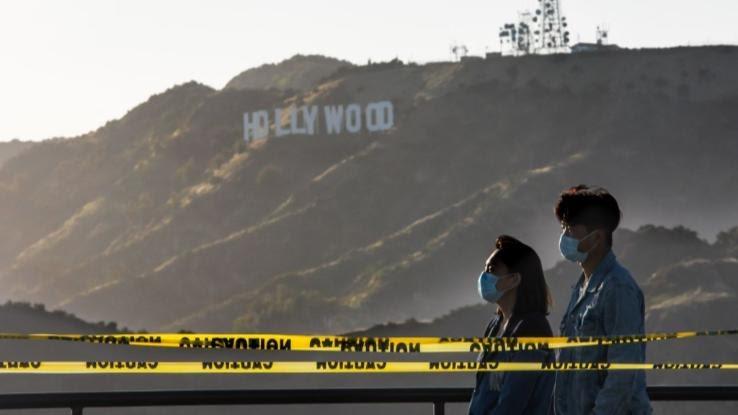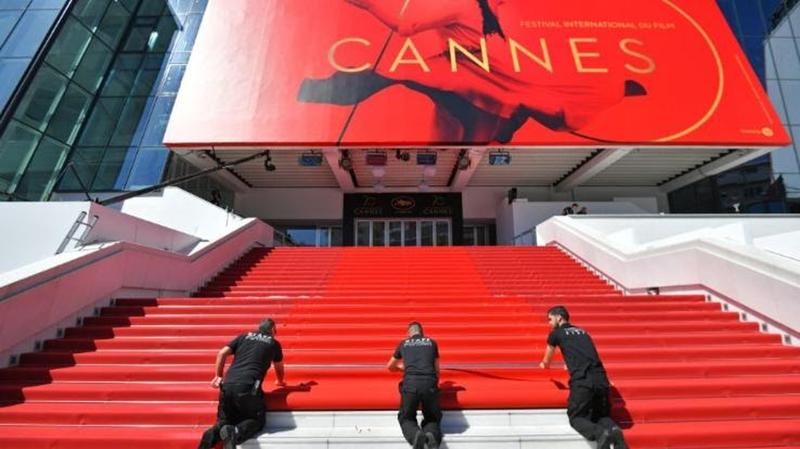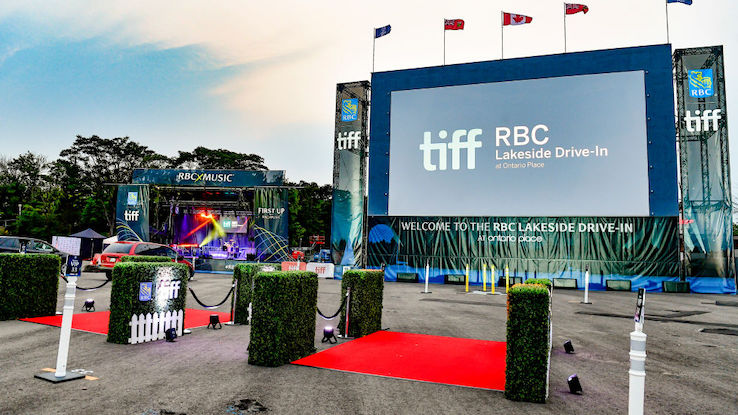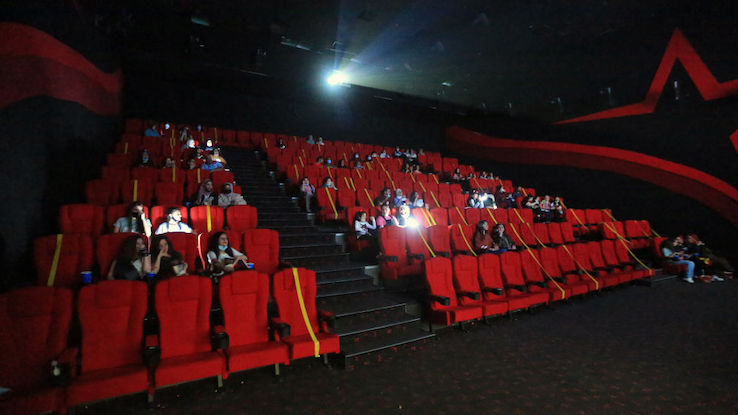
As we enter a new phase of the Covid-19 pandemic, one in which experts are beginning to speculate on what endemic Covid may look like, we are also reflecting on the ways in which our world has been permanently shaped by the pandemic. Our colleagues at Reference have already reflected on how the world of work has been permanently changed, and we’ve been considering all of the ways that the entertainment industry’s adaptations might stick around.
Everything from film sets to movie releases to awards shows have refashioned themselves at times in response to the virus. Some relatively disruptive changes had to be made to preserve and promote safety — just like in other industries — and the entertainment business has created and navigated pandemic-imposed adjustments with interesting solutions. Film festivals and awards shows especially have undergone massive changes, if not outright cancellations, since the pandemic hit. But it’s left us wondering, “do we care all that much?” It’s possible that the changes to awards season are here to stay, not just because the virus is too, but perhaps because the pandemic has shifted our priorities and shown us the ways in which we’ve outgrown some of these events.
A Massive Cannes-cellation Put a Damper on Festivities
All the glamour in the world — all the couture gowns, the red carpets, the glitzy parties — can’t change the fact that film festivals are by nature perfect superspreader events: The conditions are just right for one or a few sick people to easily spread the virus to thousands more. Hundreds of guests, many of whom travel to these events from around the world, pack into screening rooms to sit for several hours at a time watching films or listening to Q&A sessions in extremely close proximity to one another. Then they might spend a few more hours rubbing elbows at a party, all the while potentially exposing themselves or others to the coronavirus. Repeat this every day over the course of a week or so, and you’re left with a perfect storm of transmission.

Before most of us knew just how much the virus would impact the world, big-name film festival organizers hoped some brief delays would suffice for mitigating any potential effects of the developing crisis. But things got worse, not better. The Cannes Film Festival, which typically takes place in France during the month of May and is one of the most prominent annual film festivals, initially announced plans to postpone the event until late June. But as the French government extended lockdowns, organizers were forced to continue adapting, with the prestigious festival eventually conceding that the 2020 event wouldn’t take place.
Although organizers explored alternative methods of holding the festival, they ultimately determined a virtual event would be “antithetical to the spirit of the event” and that Cannes should only take place with thousands of industry professionals, spectators, photographers and members of the press physically present at a location. Instead, they released full film lineups for various categories and revealed plans to host an abbreviated, outdoor screening of just four films and several short films slated for the end of October.
In 2021 the festival returned, spending over 1 million dollars on Covid testing for attendees. Out of a total 10,000 attendees, about half attended in person. This year a similar number of attendees is expected, but 90% are expected to attend in person, and talk of testing or other mitigations is largely absent in reporting of the event. Though new variants are leading to more mild cases, they may also still lead to long-covid, which can be very serious. In addition, experts continue to tell us that public health measures still matter if we have hope for a future in which endemic Covid isn’t still very dangerous. So we’re left to wonder whether or not 1 million dollars for testing continues to be a good investment to make the event as safe as possible, or whether the event should happen at all.
Fellow Festivals Followed Suit
Cannes is one of the earlier festivals in the year — the Sundance Film Festival, which takes place in late January, had already come and gone by the time the World Health Organization declared the outbreak a pandemic — and organizers of other events initially didn’t jump to follow the French fest’s lead when it came to making cancellations. But as it became clear that the pandemic was worsening instead of improving, it also became clear that hosting in-person film festivals wouldn’t be the responsible or safe thing to do. This prompted a variety of other well-known festivals to modify plans in response to the ongoing health crisis — but not all of them opted to cancel, instead choosing to get innovative with their offerings.

The Toronto International Film Festival (TIFF), which is known for being one of the more accessible film fests around, initially announced in late June that it would be presenting a “reimagined physical and digital festival” that still maintained a (modified) version of the interactions people cherish when it comes to these events. What exactly did that mean? In addition to hosting some in-person screenings for limited audiences by enforcing social distancing guidelines and setting up drive-in and open-air theaters for participants, TIFF took place in a primarily virtual format.
This included “digital screenings, virtual red carpets, press conferences, and industry talks” that were “tailored to fit the moment.” TIFF organizers opened digital venues — live-streaming webpages — where festival-goers could virtually congregate and watch films, talks and other content online throughout the event’s mid-September run. All press and industry screenings happened digitally as well, with the festival ultimately being deemed a “slimmed-down success” thanks to its adaptability and novel platform that still engaged visitors.
Plenty of film festivals are more relaxed and intimate than the big-name shows like Cannes and TIFF, but they still faced the similar need to modify their typical formats in response to the pandemic. The Telluride Film Festival usually involves thousands of participants descending on the small Colorado town to enjoy a weekend of screenings during Labor Day. At first, organizers announced in May that 2020’s festival would continue as planned a few days after the holiday weekend — but with safety as a top priority.
However, two months later with COVID-19 case numbers continuing to rise, Telluride Film Festival leaders released a statement that the event would be canceled entirely. “Even the best strategy [for an in-person event] is threatened by this out of control environment,” part of the statement read, revealing that the group decided unanimously it wasn’t worth risking lives to attempt a socially distanced event or encourage participants to travel. In 2021 the festival returned with a lot of social distancing and strict vaccination and testing protocols. They have not yet announced plans for 2022 yet, but perhaps testing and vaccination requirements are part of that “new normal” that we’ve been searching for.
Award Shows Scrambled for New Formats — and Went Digital
Given the important role that festivals usually play in thrusting the year’s best movies into the spotlight — and the fact that films often have to debut at festivals to be eligible for entry in awards shows — the future of the 2020 award season became uncertain in the face of the pandemic, and the awards shows quickly went to work making changes. Eligibility usually requires potential films to play in physical theaters for a certain length of time, but that requirement was obviously a problem and was lifted, and has stayed out of the rulebook through 2022, with CODA becoming the first film created by a streaming platform to win Best Picture.

The 2020 Emmys managed to become a bright spot in awards adjustments thanks to the show’s pandemic-appropriate modifications. While the 72nd annual ceremony was originally supposed to happen live at L.A.’s Microsoft Theater, organizers elected to hold it in a remote format instead of canceling. And a solution came by way of everyone’s favorite pandemic communication tool; host Jimmy Kimmel introduced awards from the Staples Center to an audience of cardboard cutouts, and award winners gave their “Pand-Emmys” acceptance speeches from home via Zoom calls. Could it get more pandemic-aligned than Zoom?
Obviously cardboard cutouts aren’t the future of awards shows, but the constant iterating on new formats has revealed a different problem for these shows. Throughout the coronavirus crisis, fans have found themselves not only wondering what will happen with these shows but also reconsidering just how much they care about the shows in general. Awards show ratings had already begun to see steep declines, even before the world was thrust into quarantine. In 2019, both the Oscars and the Emmys hit an all-time low in viewership, and in 2022 Oscars ratings rebounded from 2021, to mark their second worst year ever. Could the change in perspective that comes with living through a worldwide health crisis affect major Hollywood ceremonies even more in the future?
Are Awards Shows Headed Back for the Future?
The usual arguments could be made for the reasons that award ceremonies have been tanking. Maybe they’ve gotten too politically polarizing, maybe they haven’t recovered from accusations that the awards show is rigged, or maybe Gen Z is more into YouTube and TikTok than Hollywood culture. The other side of the COVID-19 crisis, however, may see another important argument crop up. While tabloids and Hollywood gossip may have seemed like juicy, harmless fun in a pre-COVID world, there’s nothing quite like a deadly virus to put things into perspective.

Some may argue that awards shows give us a little dose of escapism, a night to indulge in a bit of fun sparkle and a peek into an aspirational world that takes the focus off of reality for just a few hours. And others may claim that there are better, more philanthropic ways the millions of dollars that go into producing these shows could be spent during a time when millions of people are suffering and need help more than ever before. Whether you believe that hosting awards shows during a pandemic is a celebration of poor taste or you’re looking forward to indulging in a few hours of star-studded reverie, the one thing that’s certain is that everything is still uncertain.
Because the crisis hasn’t fully stabilized yet (as much as we maybe would like to believe it has) it’s difficult to determine how the entertainment industry will continue to be affected. The best-laid plans can become unrealistic and irresponsible almost overnight, and so while we cross our fingers that a new variant isn’t lying in wait, we’ll also have to wait with bated breath…or creeping disdain to know the fate of awards shows.






